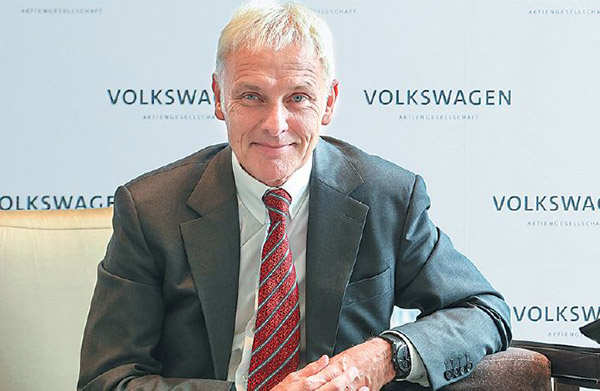Auto sector in high-tech fast lane
 |
|
Matthias Mueller is CEO of Volkswagen AG, the global automaker based in Germany. [Photo provided to China Daily] |
Editor's Note: The Communist Party of China is holding its 19th National Congress in Beijing. China Daily asked business leaders from major multinational companies for their views on economic developments here and the country's global leadership role.
Matthias Mueller is CEO of Volkswagen AG, the global automaker based in Germany.
What do you feel has been China's biggest achievement during the past five years and its most notable change?
Ambitious targets have been set under the Made in China 2025 program. Like the Industry 4.0 in Germany, the entire manufacturing process, not just innovation, is the guiding principle of this strategy. In all areas addressed by Made in China 2025, we have witnessed impressive progress.
In particular, the focus has been on digitalization, artificial intelligence, machine learning, and smart and sustainable mobility.
In the auto industry, China's market for new energy vehicles, or NEVs, has skyrocketed. NEV sales have gone from about 10,000 passenger vehicles in 2009 to around 340,000 last year. This trend is being maintained in 2017.
What is the biggest challenge China faces and how can the country overcome it?
As the government has clearly identified, the environment is one of the biggest challenges facing not just China but the world. To reduce air pollution, all parties should be involved in a joint effort to establish an effective set of regulations, which are strictly implemented.
We also see the Paris climate change agreement, to which President Xi Jinping has made a strong commitment, as a historic opportunity for mankind. There is no alternative to strict limits on greenhouse gas emissions.
And Volkswagen is determined to use these milestones on the way to zero emissions as a catalyst for market-fueled innovation for our customers.
What are your expectations for the country's economic policies and what key issues will you be watching for?
Good public policies are critical to shaping the future. Volkswagen Group China aims to be a strong and reliable partner of China's auto industry and society as a whole.
It is important for us to have a dependable and predictable regulatory framework, data security, protection of intellectual property and open access to the market. Also, we need a level playing field, and fair and open competition.
These are the preconditions of all further high-tech developments.
How do you view China's role in the world today?
The country remains one of the world's biggest markets for goods and services, and this will only continue to grow as living standards improve.
However, China has become much more than just the world's factory and a major market. It is also a large, and rapidly growing, source of ideas and investment. And it is now playing a much bigger role in a wide range of areas, such as regional infrastructure funding and supporting various United Nations activities around the world.
Could China's experiences and practices be used to solve global problems?
We are experiencing an era of disruption, not just within the automotive industry but society as a whole. Digitalization and connectivity, AI, the rise of self-driving cars, and the spread of e-mobility, as well as globalization and, in reaction, protectionism, are game changers.
We view China as an incubator for innovation and new technologies and as a source of solutions, which can be transferred to the world. In this country, the future is now.
A defining quality of the government's industrial policy has been its ability to set long-term goals and then meet them.
China is undoubtedly a leader in the global switch to new energy vehicles-a market which has attracted the attention of every major auto manufacturer. To transform these challenges into opportunities, a dependable and predictable regulatory framework, data security, protection of intellectual property and open access to the market are needed.
What is the most unforgettable experience you have had in China?
The country is a fascinating, innovative and forward-looking place. I have traveled across China often and experienced many special moments.
On my last visit, I met a group of young Chinese entrepreneurs. It was truly impressive to see their spirit and dedication.
What I appreciate is that things develop with breathtaking speed. Faster than anywhere else in the world. The transformation process in our industry is in full swing.
E-mobility has a very strong momentum and autonomous driving will take root more firmly in the future. These advances have much greater momentum in China than anywhere else in the world.
As a Fortune 500 company, which sectors do you think offer the most opportunities for development?
Undoubtedly, the automotive industry is entering a period of revolutionary change. Digitalization, connectivity, electrification, AI and autonomous driving are game-changers. We are already seeing many exciting developments in these areas, from established players, such as Volkswagen, to innovative startups.
We believe there are enormous opportunities arising from this disruptive change. But we need to team up with players in other sectors, such as energy suppliers, software developers and innovative startups, to make full use of these new opportunities.
What are the most innovative trends and products in China?
Increasing connectivity between previously separate parts of our lives has caught my attention here. This is reflected in the evolution of WeChat, from a convenient way for friends to stay in touch, to something more far-reaching, including accessing online services and e-payment.
We are steadily moving toward a Smart City in which integrated technology solutions, AI, real-time analytics and smartphones work together to deliver information and services. Indeed, Volkswagen is working with Tongji University in Shanghai on a pilot which will explore this area of (connectivity) when people need it-in our homes, cars, shopping, relaxing or at work.

























